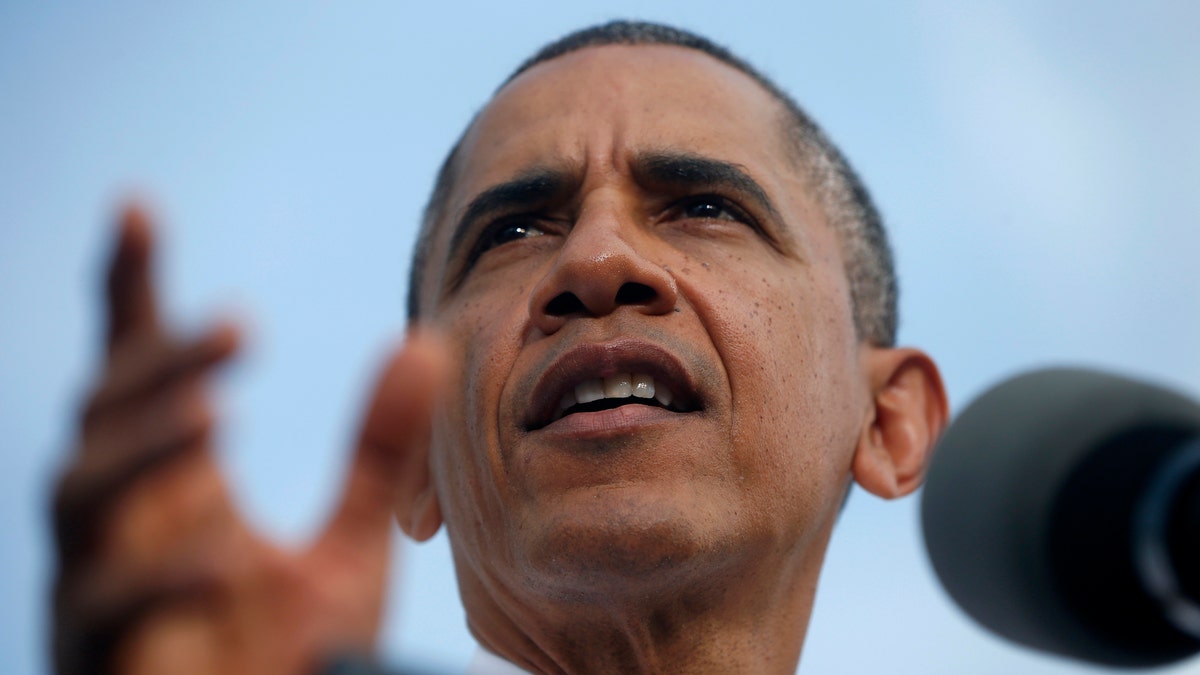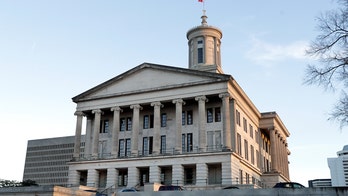
President Obama speaks in Rockville, Md., on Oct. 3, 2013. (AP)
WASHINGTON – Do Republicans want the country to default?
President Obama makes it sound that way, as the stand-off over the budget rapidly turns into a stand-off over the debt ceiling.
“They are threatening to actually force the United States to default on its obligations for the very first time in history,” Obama said Thursday in Maryland.
But the claim is one of several that don’t quite comport with the facts.
In the event Congress does not raise the debt ceiling, the Treasury Department “would make every effort to avoid default,” said economist Douglas Holtz-Eakin.
The former director of the Congressional Budget Office said there is some debate over how much flexibility the Treasury would have to prioritize certain payments. But he predicted they would find a way to make sure interest payments to bondholders are sent out first.
“I promise you – in the moment, they would do it. And who would sue them?” Holtz-Eakin said.
That’s not to say the Treasury Department would be able to avoid an economic calamity. Even if officials pay bondholders on time, without the ability to borrow, other bills would simply not get paid.
“Something’s got to give,” Holtz-Eakin said -- whether it’s Social Security payments or countless other wedges of the budget.
Chad Stone, chief economist at the Center on Budget and Policy Priorities, said while a default on U.S. debt might be avoidable, a default in the general sense would occur.
“Realistically, failure to pay any bills that legally come due, I think, qualifies as default,” he told FoxNews.com.
The blowback would be bad. Not only would swaths of government services and benefits shut down, but the instability would likely send the financial markets into a spiral. Interest rates could go up for everyone as a result of the chaos, and the U.S. government would risk another credit downgrade.
This scenario is why both sides say they want to do everything in their power to avoid missing the debt ceiling deadline – expected to be hit around Oct. 17 – and certainly avoid default.
“I don’t believe that we should default on our debt. It’s not good for our country,” House Speaker John Boehner.
At the same time, Boehner said the country’s deficit needs to be addressed.
At a press conference on Friday, he signaled a possible shift in focus away from the ObamaCare fight, arguing that Congress must fight for spending cuts as part of any deal to raise the debt ceiling. (It looks increasingly likely that the debt ceiling debate will fold into any deal to pass a budget bill and lift the partial government shutdown.)
“We ought to do something about our spending problem and the lack of economic growth in our country,” Boehner said.
To this end, Obama has been stressing that deficits are falling, suggesting that the imperative to make major spending cuts is not as strong as it once was.
Plus, he argues that raising the debt ceiling does not add to the debt.
“That's not what this is about. It doesn't cost taxpayers a single dime,” Obama said on Thursday. “It doesn't grow our deficits by a single dime. …What it does is allow the U.S. Treasury, the U.S. government to pay the bills that Congress has already racked up.”
Technically, he’s right. Raising the debt ceiling allows the government to pay bills it already racked up.
But it clears the way for the government to keep passing in-the-red budgets, and in due time bump up against the newly raised debt ceiling once more. In other words, raising the credit limit practically guarantees the country will max out the credit card again.
And while the 2013 projected deficit is thankfully under $1 trillion for the first time since 2008, it is still higher than it was at any point during the George W. Bush administration, when Democrats complained about unsustainable deficits.
Republicans argue they are no more sustainable now.
Further, while Obama says raising the debt ceiling is only done to pay for bills Congress has accumulated, the deficit and the debt would be even higher if Congress had approved the spend-heavy budgets the White House proposed over the last several years.
Also, deficits would be lower if White House revenue projections, which help inform spending decisions, had come to pass. Yet each year, revenue has fallen short of what the White House projected a year earlier, in part because the economy has failed to slingshot out of the recession.




